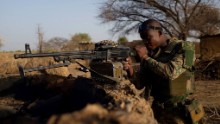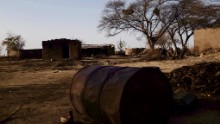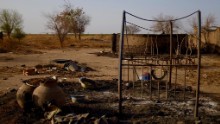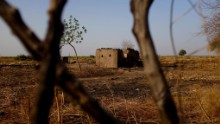
Maiduguri, Nigeria (CNN)As night falls, the curfew comes into effect. Nobody is allowed on the streets. Anxiety hangs in the air.
Those unable to make it home before sunset are shepherded to roundabouts to wait until day breaks.
This is Maiduguri -- a city on the edge.
The capital of Borno state, it is at the heart of the Nigerian Army's battle to retake Boko Haram territory. A place where no one is above suspicion. Where young girls, packaged as suicide bombers, are sent by militants to realize the group's brutal jihad.
Teenagers outside of the city's comparative safety -- like the Chibok girls -- are targeted and snatched away by Boko Haram. Forced into marriage, they enduring years of rape by their self-proclaimed husbands. Then they volunteer to die. The risk of being strapped with a bomb more appealing than remaining in the group's Sambisa Forest stronghold, their personal hell on earth.
And yet, despite the threat of suicide attack, Maidugiri has become a beacon. An oasis in the northeast of Nigeria where a civilian joint task force works to protect its inhabitants. Today an estimated 2.5 million people have been displaced across the northeast of the country and the city's camps has become a haven for over a million people left homeless.
With limited access to health care, clean water and sanitation, the risk of illness is high. The tension is palpable and everyone is on alert.
The Sambisa fortress
The campaign to eradicate Boko Haram and recover the girls, code named "Lafiya Dole" -- meaning "Peace by any means" in Hausa -- is coordinated from Maiduguri. Nigeria's government has been condemned -- with critics both at home and abroad -- for its ineffective response to the mass kidnapping. But it isn't until you come to the region that one truly comprehends the mammoth task placed on the shoulders of the nation's troops.
It has long been thought the Chibok girls were spirited away to the Sambisa Forest -- a dry savannah of harsh terrain. Originally marked as a game reserve by colonists, it was overrun by the Islamic insurgents several years ago. Covered in soft, light sand and brutal, dense bush, it is ideal for burying improvised explosive devices, or IEDs, and shielding militants from prying eyes.
Two years ago, when CNN first visited Chibok after 276 girls were taken from their school dormitory at gunpoint, parents described how they followed their daughters' trail to the edge of the forest. But with danger lurking amid the vegetation, they were unable to go any further.
Since then, soldiers have intensified their efforts, infiltrating the Sambisa fortress, and in the process partially liberating the state from Boko Haram's stranglehold. But the militants still hold territory right in the heart of the forest.
And it is in this area where many believe the Chibok girls are still held. The region's soft sand is ideal for hiding improvised explosive devices, or IEDs. This means the military must travel in heavily armored convoys with mine-proof trucks providing protection from the front. Empty ammunition cases litter the ground, untouched since they flew from the machine guns used in a skirmish between the Nigerian army and Boko Haram fighters.
The operation's "theater commander" Maj. Gen. Leo Irabor tells CNN that while he is proud of his men's achievements in pushing back Boko Haram, they are in need of more international support to quash the insurgents.
Under Operation "Lafiya Dole" -- meaning "peace by any means" in Hausa -- the Nigerian army is working under intense scrutiny to locate and return the stolen Chibok girls to their parents.





CNN's Nima Elbagir joins the Nigerian army as it heads into the Sambisa Forest in search of the stolen Chibok girls



0 comments